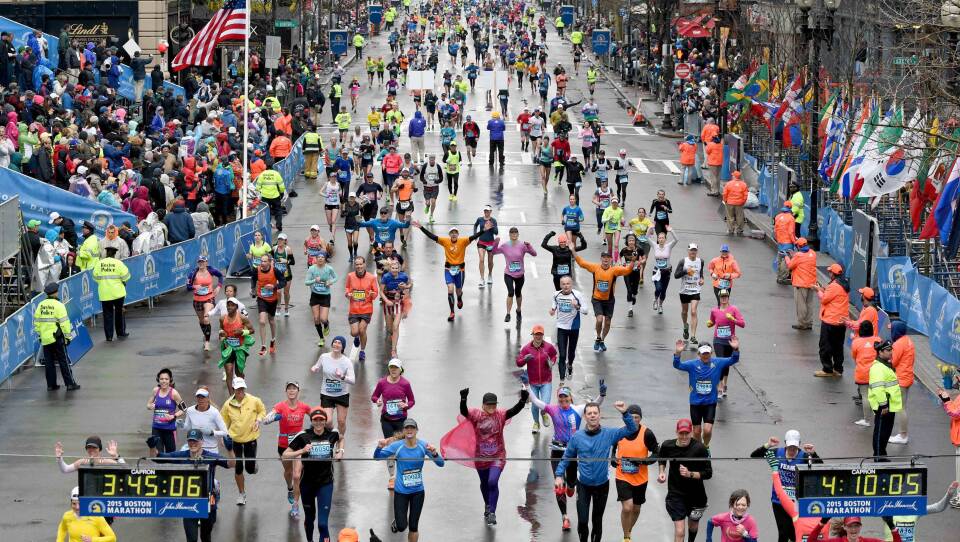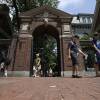Every third Monday of April, Boston and its western suburbs transform into a race course.
The city shuts down as the Boston Marathon, maybe the most prestigious long-distance foot race on the planet, takes over. The sides of streets turn into a 26.2 mile-long grandstand stretching from Hopkinton to Copley Square.
Runners from all around the globe turn Boston into the center of the racing world and regular athletes get the chance to know what it’s like to hear thousands of people cheering for them.
The marathon has been a part of the city’s lore since 1897. Since then, there has always been a race in April commemorating Patriots’ Day.
But not this year. Because of the coronavirus, the race has been postponed until September, marking the first time in over a century that the Boston Marathon won't be run in the spring. The event has only been altered once, in 1918, when a military relay race was held to honor those serving in World War I. But even then, a race still happened in April.
Amanda Nurse, a runner and coach who has run in multiple Boston Marathons and Olympic trials, compares Marathon Monday to another holiday people hold with reverence.
“It’s almost like Christmas for runners to feel like, you know, you work so hard up to that point,” the Brookline resident said. “And that weekend is always so much fun. There’s always so much to do. So many people around, so many people from all over the world. It’s such a cool experience. It’s unlike anything else that ever comes to Boston.”
The March announcement that the marathon was being postponed because of the coronavirus didn’t necessarily come as a shock. By then, the sports world had already skid to a sudden halt .
But that was cold comfort for the runners who were nearing the end of months of training. Nurse said that the announcement came as runners were nearing peak fitness.
“When people found out they weren’t going to be able to run, most people were hitting their max mileage. They’re getting into the best shape of their lives, and it’s almost time to taper and then they find out it’s going to be canceled,” she said. “So that’s devastating.”
Nurse said the month of March was stressful as a coach, as she tried to help runners figure out their next steps.
“I was getting so many questions about it,” she said. “How does this effect my training? Should I still be doing it if I’m signed up for another fall marathon? What does this mean for my fitness right now? What do I do?”
April 20 was supposed to be Anatoly Prekrasnyy’s first Boston Marathon. His fiancée had tried to convince him to get back into running after a hiatus by saying she would simply buy him entrée to the race, not knowing just how much work it takes to get in.
That was two years ago. Since then, Prekrasnyy got a bib by raising money for the Framingham Public Library. And he’s learned a thing or two about the marathon in the process.
“I have researched everything about it. I know so much,” he said. “And it’s been a very big dream of mine. And it was supposed to be a very big celebration for me.”
For Pauline November, this was supposed to be her first marathon, ever. She went to Wheelock College and has seen runners of every stripe take on the course, inspiring her to do the same.
The Brighton resident said she was crushed when she heard the race would be pushed back.
“I had been training since December. I had a four-month plan,” she said. “So I was right at the end of the peak of the training. ... I was just so upset.”
Marathon Monday is when all those early morning runs through the cold when your legs feel like they’re about to fall off are supposed to pay off.
For Chaz Davis, though, it was supposed to be something more. For the first time ever, the marathon is including competitive divisions for para runners, making it the first major marathon to do so. It’s also the U.S. Paralympic team trial for the marathon distance.
The race had already included wheelchair and handcycle divisions. Davis ran the marathon for the first time in 2018.
Davis, who grew up in the Worcester area and went to the 2016 Paralympics in the T12 category , one of the classes for those with visual impairments, felt hurt because a huge stage for para-athletes was being pushed farther away.
“I knew that this was a really big moment for para-athletes,” he said. “It was going to be on TV. I think we would have had the opportunity to showcase disabled sport to not only the Boston community, but even larger than that.”
On a quiet Marathon Monday, some are still taking the time to run on their own. November is planning to run 20 miles, her longest distance to date. Davis plans to run a symbolic 2.62-mile race with others using an app.
Because of the coronavirus, running has suddenly become one of the only outside physical activities that people can still do. Whether people are training for a race or not, running is helping them cope during a difficult time, said Nurse.
“Even if you’re not even a runner, you’re becoming a runner right now because no gyms are open, no other form of activity is really available right now other than at home workouts or running,” she said. “So it’s kind of a cool time in the running world to feel like everyone’s just getting out there and doing their best to cope with the situation.”
Despite the uncertainty, Boston Marathon runners can look forward to Sept. 14, the new date for the event.
“It just will mean that much more to people to take part in an event that really will be different than any other marathon in 124 years,” Davis said. “So I look at that as something special that we hope no one else has to ever deal with.”
If the marathon does happen as planned in the fall, it will be bigger than just a race. Boston officials like Mayor Marty Walsh say it will be the centerpiece of the city's efforts to spark a recovery for local businesses that had to shut down because of the pandemic.
Davis, who remembers coming up from college in Connecticut to watch the race and seeing many of the city’s college students pour out along the course to cheer runners on, said this eerie Marathon Monday will solidify just how much has changed in a short period of time.
“But hopefully we can come back in September and just be able to celebrate the return to everything,” he said. “And what that new normal will look like is really yet to be seen, but I think the Boston Marathon will just be a great opportunity to really all come together again.”
It would be a time to reflect on the long road the city and the planet is currently running as it navigates this crisis. And Boston would finally get a chance to get the race day promised every spring.






